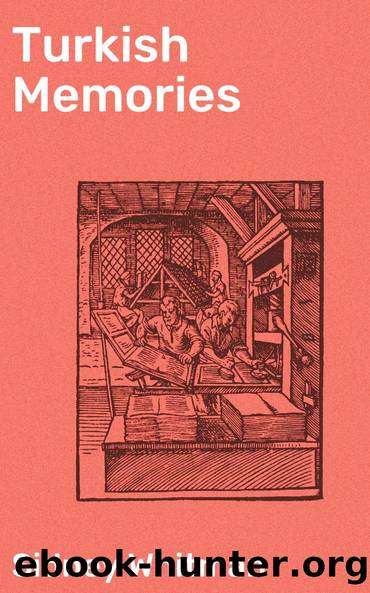Turkish Memories by Sidney Whitman

Author:Sidney Whitman [Whitman, Sidney]
Language: eng
Format: epub
Tags: Classics, Nonfiction, Reference & Language, Reference, Fiction & Literature
ISBN: 4057664604750
Publisher: Good Press
Published: 2019-11-27T05:00:00+00:00
Listen: [MP3] [MIDI]
Music XML: [MusicXML]
Musescore: [MuseScore]
The band now strikes up the Austrian âDouble-Eagle March.â It is almost imperative to have heard the famous trio of this most enthralling of military marchesâa languorous, sensual themeâin order to gain an idea of the effect a military band is capable of producing upon a susceptible crowd. The popularity of the âDouble-Eagle Marchâ throughout Austria-Hungary and the German Empire has long been general. Composed by a bandmaster of an Austrian regiment, it has been set to music in close upon twenty different arrangements. A great deal of what is incomprehensible to strangers in latter-day Germany may be attributed to the effect of this popular military march on the public, and, what is more, on those who are supposed to influence and inspire it. If there is a march in the whole world which produces intoxication without either alcohol or hashish, it is this one.
A parallel to the last years of the Second Empire and Jacques Offenbachâs Grande Duchesse de Gerolstein, General Boum-Boum, and Prince Paul would suggest itself on the occasions when foreign princes and princesses with their hungry retinues came to visit the Sultan. The Prince Imperial would find his counterpart in the Sultanâs poor little sons, who got on horseback and figured in the pageantry of the Selamlik. It is a wonder that there were still some quiet nooks in which a philosophic contemplation of the vanity of things could be indulged.
One day, now long ago, I paid a call on Munir Pasha at his office after the Selamlik. I have already had occasion to mention this high-bred, gracious, and kind Turkish gentleman. Not a breath of scandal, slander, or concession-mongering ever touched this man, whose influential position during many years might have brought him wealth for the mere asking.
âHow are you to-day, my dear pasha?â I asked, as he came beaming with kindliness towards me, shaking hands in European fashion, a form of greeting rarely indulged in by the Turk. âAh, mon cher!â he replied, as a hamal (porter) passed in front of the window, carrying a dinner tray on his head, âyou see that poor fellow! How gladly would I exchange with him, and hand him over all my forty-two Grand Cordons into the bargain, if he could only give me his lusty health in return.â Munir Pasha was a martyr to asthma, and before my next visit to Constantinople he had passed away.
Download
This site does not store any files on its server. We only index and link to content provided by other sites. Please contact the content providers to delete copyright contents if any and email us, we'll remove relevant links or contents immediately.
| Africa | Americas |
| Arctic & Antarctica | Asia |
| Australia & Oceania | Europe |
| Middle East | Russia |
| United States | World |
| Ancient Civilizations | Military |
| Historical Study & Educational Resources |
Empire of the Sikhs by Patwant Singh(23066)
The Wind in My Hair by Masih Alinejad(5085)
Rise and Kill First by Ronen Bergman(4772)
The Templars by Dan Jones(4678)
The Rape of Nanking by Iris Chang(4194)
12 Strong by Doug Stanton(3541)
Blood and Sand by Alex Von Tunzelmann(3187)
Babylon's Ark by Lawrence Anthony(2666)
The History of Jihad: From Muhammad to ISIS by Spencer Robert(2615)
No Room for Small Dreams by Shimon Peres(2356)
The Turkish Psychedelic Explosion by Daniel Spicer(2352)
Inside the Middle East by Avi Melamed(2347)
Gideon's Spies: The Secret History of the Mossad by Gordon Thomas(2330)
Arabs by Eugene Rogan(2291)
The First Muslim The Story of Muhammad by Lesley Hazleton(2257)
Come, Tell Me How You Live by Mallowan Agatha Christie(2244)
Bus on Jaffa Road by Mike Kelly(2147)
1453 by Roger Crowley(2018)
Kabul 1841-42: Battle Story by Edmund Yorke(2014)
